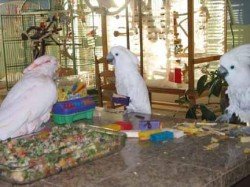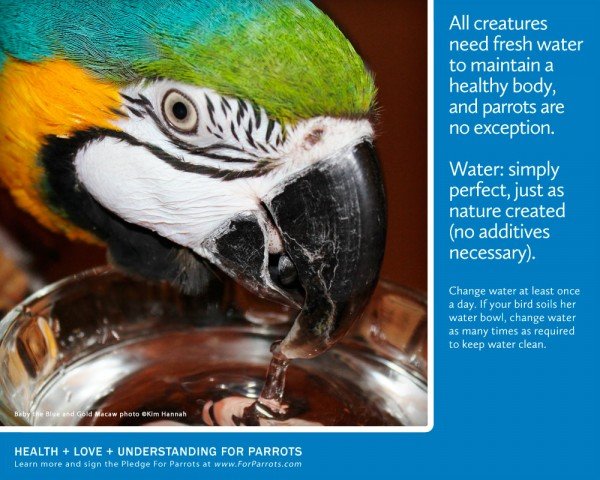Today’s post by guest blogger Shauna Roberts (FeedingFeathers) is all about water. Some things might seem complicated when it comes to nutrition for parrots, but when it come to water, simple and basic is best!
 Water makes up a large percentage of body weight and is critical for life. Once in the body water becomes the fluid in which all life processes occur. It carries nutrients and waste products throughout the body. Participates in chemical reactions. Serves as a solvent for minerals, vitamins, amino acids, glucose and more. It also aids in thermoregulation and maintains blood volume. The body maintains water balance by intake and output. Water is necessary to prevent dehydration. Dehydration if left unresolved can lead to several health complications and even death.
Water makes up a large percentage of body weight and is critical for life. Once in the body water becomes the fluid in which all life processes occur. It carries nutrients and waste products throughout the body. Participates in chemical reactions. Serves as a solvent for minerals, vitamins, amino acids, glucose and more. It also aids in thermoregulation and maintains blood volume. The body maintains water balance by intake and output. Water is necessary to prevent dehydration. Dehydration if left unresolved can lead to several health complications and even death.
Supplying a clean water source is extremely important. Intake of water can vary per bird and will also vary some per diet. If eating a mostly dry diet then water intake will be higher than if eating wet foods such as vegetables. Vegetables can contain up to 90% water, and legumes around 60-70% water.
A vivid memory concerns a single macaw drinking. Parrots find water in different ways, the most common being in bromeliads in rainforest and from streams in open country.
Here these options did not exist. The macaw had walked across the muddy ground, interspersed with clumps of grass, to reach a large dirty puddle. At the end of the dry season this was all that survived of a larger extent of water. The macaw drank its fill, lifting its head time after time to let the water trickle down its throat.
-Rosemary Low, Wild Parrots Up Close
There are many ways to supply clean water:
- To help ensure clean water a water bottle may be used. If using a water bottle check the valve daily that it isn’t plugged such as a parrot jamming a piece of wood inside the nozzle. Also be sure to wash the bottle and value regularly in a dishwasher, hand washing alone may not clean the value well enough. Also make sure your parrot has learned how to use a water bottle before leaving it as the only source of water.
- Change water at least once a day. If your bird soils a water bowl with feces or food, change water as many times a day as required to keep water clean. Also make sure there aren’t perches above a water dish, with a bowl ending up being part of the poop zone.
- Always wash bowls in warm soapy water (rinse well!) or put in a dishwasher daily.
There are several sources of water:
- Many city tap waters are fine, and if chlorine is added by the town, a water filter could be added to your sink that removes chlorine and other chemicals.
- Bottled water is another choice, although many bottled waters are no better/worse than town municipal water.
- Reverse osmosis or distilled water is pure water. There is a myth that this water will leach minerals from the body or another statement that it won’t supply any minerals. If water leaches any minerals from the body it would be extremely minute and not a concern. As far as water supplying minerals, water is not considered a dietary source of minerals, there just aren’t enough of them in water to consider it as dietary source of minerals. Far more minerals are received by eating foods.
Some thoughts on adding vitamins, aloe, or other additives to water:
Plain water as nature intended is always best and is what’s recommended for drinking (and also bathing).
Adding Vitamins
Vitamins in the water are still commonly found for purchase, but have not been recommended for several years. The possible issues are:
- A bird that doesn’t drink enough water due to water tasting off to them and becoming dehydrated.
- If the environment is hot, a bird may drink more than normal and get too much supplementation, which maybe result in toxicity.
- Sunlight can break down vitamins, so what you think you might be supplementing may not be so.
- If a bird has kidney or other issues that cause it to drink excess water, they could end up with too much supplementation.
- What might be added to water is medication under veterinary advice. Although not the best way to medicate for a skittish bird or sometimes very small bird, this may be a first least-intrusive option to try.
- For very little birds, if not eating pellets or having an iodine source, adding to water following directions and veterinary direction is sometimes done. Occasionally calcium may also be prescribed to add to a bird’s water for a recommended amount of time.
Adding Aloe
For several years the suggestion of adding aloe to water also pops up. Amounts of aloe to add to water vary and may even be as little as 1/8 teaspoon, but usually without any consideration to the size of a water bowl. A budgie’s water bowl is a very different size than a large macaw’s.
Aloe taken orally has some possible side effects that could be serious. Some may think a small amount can’t do any harm, but if there is enough aloe in water to be of any help, then there will also be the potential of eventual harm. As there aren’t any studies at this time involving parrots and aloe, I will mention warnings and side effects for humans:
- May lower blood sugar levels.
- Avoid taking aloe orally for prolonged periods as a laxative, due to theoretical risk of dehydration and electrolyte imbalance.
- Use caution in patients with kidney disease, heart disease, or electrolyte abnormalities, due to theoretical risk of low blood potassium levels. Extremely low potassium levels could result in death.
- Use cautiously in patients with impaired liver function due to reports of hepatitis from taking aloe by mouth.
- “Aloe may cause ammonium acid urate stones; delayed wound healing; dry skin; excessive bleeding (one case); gastrointestinal distress (abdominal cramping and diarrhea); Henoch-Schonlein purpura; hepatitis; increased risk of colon cancer, low potassium, worsened constipation and/or dependency on laxatives (with long-term use); irregular heartbeat; itchiness; muscle weakness; photodermatitis; skin changes (redness, stinging, hardness, soreness, and fissures); or thyroid dysfunction. ” Mayo Clinic
Water is also great for bathing your bird, and again plain water is BEST! Aloe added to water leaves a sticky film causing a birds feathers to become dirty that much faster.
Water moisturizes nares and feathers. Water is not drying to skin or feathers. If using a water bottle to spritz birds, be sure to empty water every time and wash bottle out the best you can and let dry to prevent bacteria forming in the bottle.
Baby the Macaw’s Bonus Poster!
About Shauna Roberts:
 Shauna has had an interest in nutrition since the mid late 1960s. She renewed that interest in 1997 when a cockatoo wasn’t doing well on pellets, and she realized a fresh diet was needed. The bird is now over 17 and doing well, as is the rest of her flock – now 16 – some of which arrived with dietary health issues. She is also a diet consultant for the parrot welfare organization, The Gabriel Foundation. Her research has taken her to various conferences to listen to nutrition experts as far as Japan and EU, as well as attending AAV (Association of Avian Veterinarians) conferences since 2003 in her mission to learn.
Shauna has had an interest in nutrition since the mid late 1960s. She renewed that interest in 1997 when a cockatoo wasn’t doing well on pellets, and she realized a fresh diet was needed. The bird is now over 17 and doing well, as is the rest of her flock – now 16 – some of which arrived with dietary health issues. She is also a diet consultant for the parrot welfare organization, The Gabriel Foundation. Her research has taken her to various conferences to listen to nutrition experts as far as Japan and EU, as well as attending AAV (Association of Avian Veterinarians) conferences since 2003 in her mission to learn.
After retiring as a veterinary assistant, she discovered the internet and has been learning from and helping bird owners since 1995. In 2003, a parrot food list was founded named FeedingFeathers and now has over 3,700 members.
Further information:
- FeedingFeathers food list (a Yahoo group)
- FeedingFeathers on facebook
- What Are The Dangers of Aloe Vera Juice
- National Center for Complementary and Alternative Medicine: Aloe Vera
- Journal of Primary Health Care: Aloe Vera
- Mayo Clinic: Aloe Vera










No comments yet.